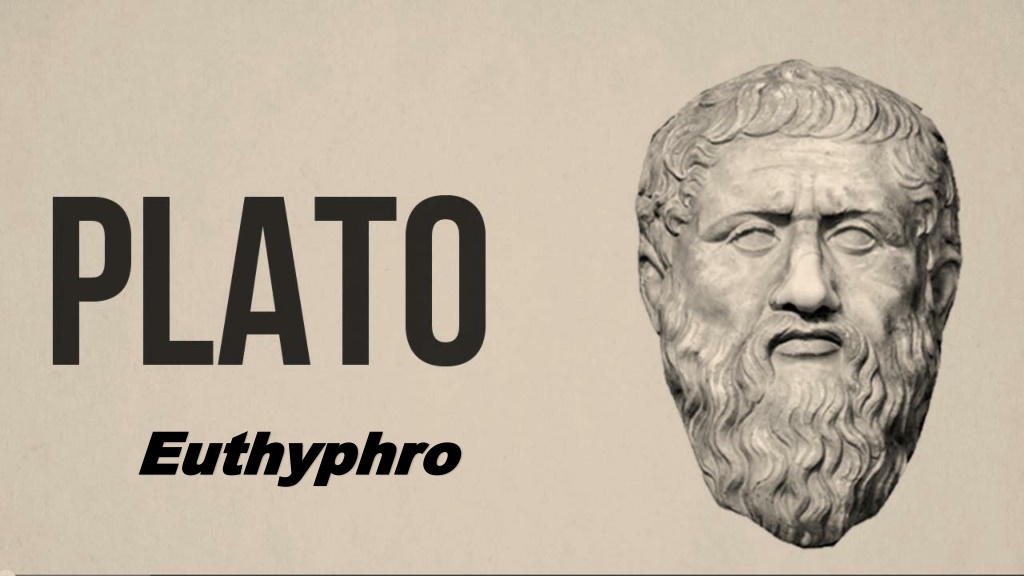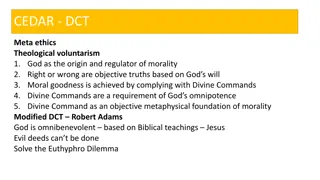
Euthyphro Dialogue: Socrates and Piety Exploration
Dive into Plato's "Euthyphro" dialogue where Socrates and Euthyphro discuss the nature of piety and its importance in understanding morality and religion. Discover the intriguing debate on piety, impiety, and the relationship between God and moral values.
Download Presentation

Please find below an Image/Link to download the presentation.
The content on the website is provided AS IS for your information and personal use only. It may not be sold, licensed, or shared on other websites without obtaining consent from the author. If you encounter any issues during the download, it is possible that the publisher has removed the file from their server.
You are allowed to download the files provided on this website for personal or commercial use, subject to the condition that they are used lawfully. All files are the property of their respective owners.
The content on the website is provided AS IS for your information and personal use only. It may not be sold, licensed, or shared on other websites without obtaining consent from the author.
E N D
Presentation Transcript
Euthyphro Euthyphro
Euthyphro is a dialogue by Plato [427347 BCE] written (399/395) The main characters: Outside courthouse awaiting for trial Socrates (470-399) Euthyphro (?-?) Dialogue about? Euthyphro and Socrates try to establish the meaning and nature of piety.
What is Piety? What is Piety? Reverence for the gods (or God) or devout fulfillment of religious obligations.
Why so much interest in piety? Why so much interest in piety? A problem that has preoccupied humans since at least the time of Socrates: the relationship between religion and morality. Is God the source of moral values, or can they be two independent of God? And if moral values are independent of God, then is morality manmade? As William Lane Craig declared, If God does not exist as the paradigm of morality, then morality is only an aid to survival and reproduction, but otherwise illusory.
What is Socrates doing by the courthouse? What is Socrates doing by the courthouse? Three Athenians file a suit against Socrates alleging that he is impious: Corrupting the youth of Athens. Not believing in the gods of the state.
A dependent of Euthyphro got drunk and killed a domestic servant. Euthyphro s father bound the drunk dependent hand and foot. Meanwhile the man dies. The Facts The Facts Euthyphro takes his father to court for murder. Euthyphro s family are angry with him for prosecuting his father. They say that a son who prosecutes a father is impious. Euthyphro claims that his family s reaction shows how little they know what the gods think about piety and impiety.
Socrates Reaction Socrates Reaction Socrates is stunned by Euthyphro's confidence. Athenian Law allows only relatives of the deceased to file suit for murder. Euthyphro claims to be an expert in religion and morality. Socrates asks Euthyphro to teach him what he knows about piety and impiety.
Euthyphros Definitions Euthyphro s Definitions Euthyphro accepts to teach Socrates the nature of piety. Euthyphro gives 3 definitions of piety. He fails to give a viable definition.
Definition Definition 1 1 The pious is to do what I do.
Definition 2 Definition 2 The pious is what is dear to the gods.
Definition 3 Definition 3 It is actually Socrates then suggests: Perhaps you should amend the definition to this: The pious is what all the gods love.
Euthyphro accepts the amendment. Does it satisfy Socrates? (A) Is the pious loved by all the gods because it is pious? Or (B) Is something pious because it is loved by all the gods?
(A) (A) T The pious is loved by all the gods because he pious is loved by all the gods because it is pious it is pious. . Pious Hey all, look! It is the pious. We all love it.
(B): (B): S Something is pious because omething is pious because it is loved it is loved by all the gods? by all the gods? Hey all, look! Do we all love it. Yes! So it is pious
So what is piety? Euthyphro: Care for the gods. Socrates: Cannot be care because the gods are perfect! Euthyphro: Well, the gods benefit from our prayer and sacrifice. Socrates: So the pious is not dear to the gods? Euthyphro: Of course it is! It is what s most dear to them. Socrates: But isn t this the definition we rejected before?


